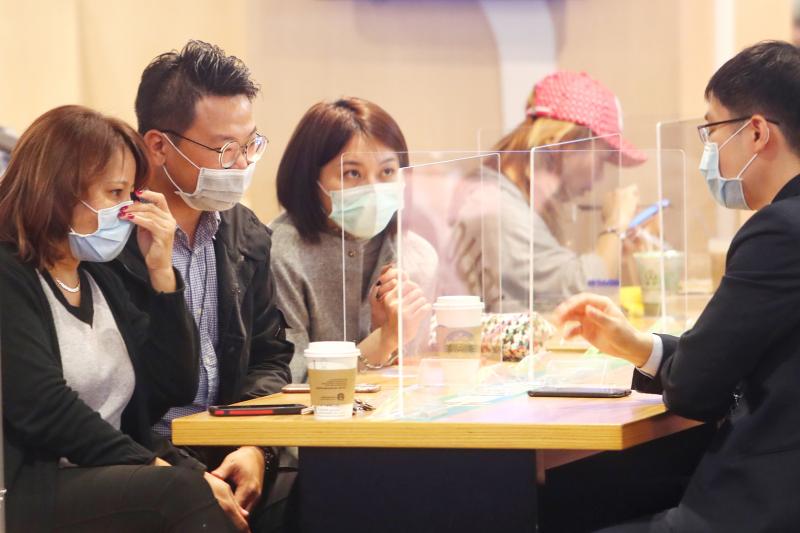Minister of Health and Welfare Chen Shih-chung (陳時中) yesterday elaborated on the rules for “social distancing” and said that the government is providing subsidies to encourage more hotels to become quarantine hotels.
Chen on Tuesday urged the public to practice social distancing by keeping at least 1m apart outdoors and 1.5m apart indoors.
If maintaining such distances is not possible due to confined or crowded spaces, then everyone should wear a mask, Chen yesterday told a daily news briefing at the Central Epidemic Command Center (CECC) in Taipei.

Photo: CNA
The center also suggested that people avoid exhibitions, sports events, concerts and other social activities that require close interaction with others, as well as nonessential visits to entertainment venues, whose owners — if they are likely to have close interactions with others and cannot wear masks — should consider suspending operations.
The flexible policy that has been implemented is mainly aimed at persuading people to observe proper social distancing, said Chen, who heads the center.
Stricter regulations and corresponding penalties might be introduced if the virus crisis worsens, but the center has not set a time frame or conditions for their implementation, he added.
People should wear a mask when traveling on MRT metropolitan rail networks and high-speed trains, where it is difficult to maintain a safe distance, Chen said.
Students in the same class are not random strangers, so they do not necessarily have to wear a mask if the classroom has proper ventilation, he said.
Restaurant owners can consider installing divider boards to separate customers to reduce the risk of infection, he added.
In addition, the Tourism Bureau is providing a subsidy of NT$1,000 per room per night until June 30 to encourage more hotels to become quarantine hotels for people in home quarantine, Chen said.
Hotels would be required to comply with establishment and management regulations for quarantine hotels published by the center and cooperate with the bureau and local government policies, the CECC said.
While people who break home quarantine orders were previously fined and taken to a centralized quarantine center if they breached the order twice, Chen said that they would now be remanded to a quarantine facility after the first offense, deprived of a government quarantine subsidy and required to pay for additional expenses, including their accommodations.
Deputy Minister of the Interior Chen Tsung-yen (陳宗彥), who is deputy head of the CECC, said that the number of people in mandatory home quarantine hit a high of more than 55,000 on Saturday last week, but had fallen to about 48,000 as of yesterday.
Effective immediately, residents of outlying islands who are placed in home quarantine would be banned from taking domestic flights or boat rides, so they would have to complete the 14-day quarantine on Taiwan proper, he said.
In addition, a temporary ban on international transit flights is to be extended until April 30, he added.
Separately yesterday, the Environmental Protection Administration increased the minimum fine for dumping masks from NT$1,200 to NT$3,600.
People caught dumping masks face a fine of NT$3,600 for a first offense and NT$6,000 for each repeat infraction, it said.
Additional reporting by Lin Chia-nan

South Korean K-pop girl group Blackpink are to make Kaohsiung the first stop on their Asia tour when they perform at Kaohsiung National Stadium on Oct. 18 and 19, the event organizer said yesterday. The upcoming performances will also make Blackpink the first girl group ever to perform twice at the stadium. It will be the group’s third visit to Taiwan to stage a concert. The last time Blackpink held a concert in the city was in March 2023. Their first concert in Taiwan was on March 3, 2019, at NTSU Arena (Linkou Arena). The group’s 2022-2023 “Born Pink” tour set a

The Taiwan High Court yesterday upheld a lower court’s decision that ruled in favor of former president Tsai Ing-wen (蔡英文) regarding the legitimacy of her doctoral degree. The issue surrounding Tsai’s academic credentials was raised by former political talk show host Dennis Peng (彭文正) in a Facebook post in June 2019, when Tsai was seeking re-election. Peng has repeatedly accused Tsai of never completing her doctoral dissertation to get a doctoral degree in law from the London School of Economics and Political Science (LSE) in 1984. He subsequently filed a declaratory action charging that

The Hualien Branch of the High Court today sentenced the main suspect in the 2021 fatal derailment of the Taroko Express to 12 years and six months in jail in the second trial of the suspect for his role in Taiwan’s deadliest train crash. Lee Yi-hsiang (李義祥), the driver of a crane truck that fell onto the tracks and which the the Taiwan Railways Administration's (TRA) train crashed into in an accident that killed 49 people and injured 200, was sentenced to seven years and 10 months in the first trial by the Hualien District Court in 2022. Hoa Van Hao, a

The Sports Administration yesterday demanded an apology from the national table tennis association for barring 17-year-old Yeh Yi-tian (葉伊恬) from competing in the upcoming World Table Tennis (WTT) United States Smash tournament in Las Vegas this July. The sports agency said in a statement that the Chinese Taipei Table Tennis Association (CTTTA) must explain to the public why it withdrew Yeh from the WTT tournament in Las Vegas. The sports agency said it contacted the association to express its disapproval of the decision-making process after receiving a complaint from Yeh’s coach, Chuang